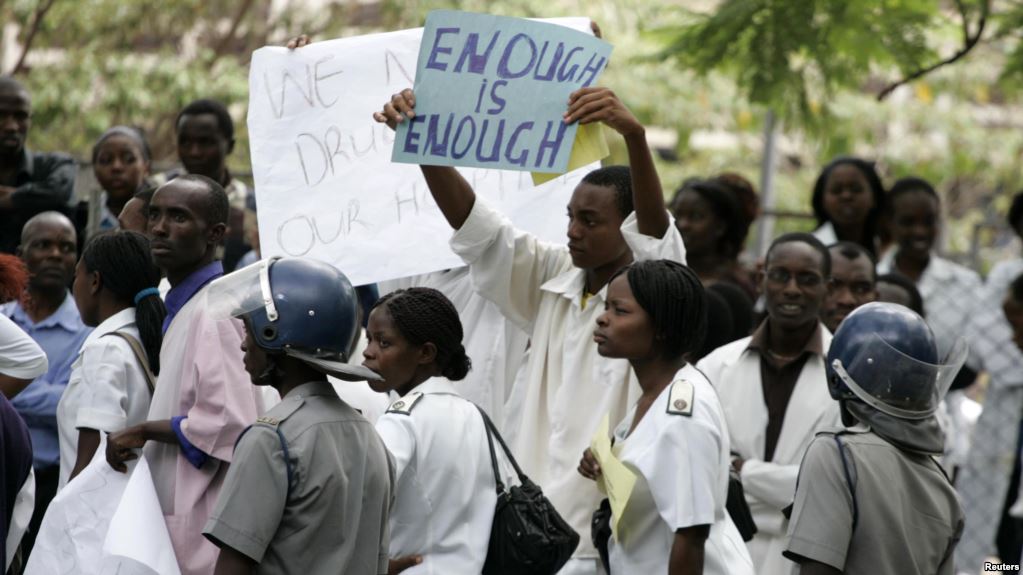The Public Service Commission (PSC) says civil servants should be patient and understand efforts being made to improve their livelihoods and working conditions as government strives to balance between salaries and other national priorities such as Covid-19 which require fiscal intervention.
Government and its thousands of workers have been in continuous talks over salaries and working conditions through the tripartite negotiating forum with some sections of workers downing tools at some point.
The ravaging global Covid-19 pandemic divided Government capacity as huge sums of funds have to be channeled towards health services which largely cover the public service including the generality of citizens.
The PSC, whose responsibility is to administer Zimbabwe through line ministries that deliver services and lead the way by coming up with strategic plans that align with the reigning policy document, is meeting in Victoria Falls to review its five-year strategic plan and come up with implementable strategies and work streams with a view of making the public service contribute to the National Development Strategy 1 (NDS1) and Vision 2030.
In an interview on the sidelines of the meeting, PSC secretary Ambassador Jonathan Wutawunashe said the commission’s work revolves around human capital development, hence it is aligning the behaviour of the civil service with the demands of Vision 2030.
He said Government seeks to continuously improve civil servants’ livelihoods and make the public service attractive, noting that the success of the country’s economic development plan hinges on the contribution of Government workers.
Ambassador Wutawunashe urged civil servants to be patient saying Government cannot exhaust all funds on remuneration.
“We have to situate ourselves as PSC in the delivery of the objectives of the National Development Strategy 1. Government and its workers have been on a path of continuous improvement and issues are debated within what is possible. So, whatever is possible Government will do at any given time.
“Definitely emoluments have been improving phenomenally and at the same time Government is not just saying let us improve salaries because that can have huge inflationary impacts, but it is also looking at how to expand the dollar that is in the pocket of the civil servants hence we come in and expand the bus fleet where civil servants fare structure is supportive of public workers,” he said.
He urged workers to appreciate that Government is operating within the constraints of the fiscus which is why it is supporting the livelihood of civil servants by protecting their take home, a critical issue that Government has succeeded in.
“What we don’t pay in taxes does not go into the coffers of Government and therefore we cannot sit and dream up revenue sources.
However, where revenue does come up through other means we do make sure that a rational apportionment of that revenue is done. It will be irrational to exhaust all funds in emoluments where you have pledged to help the entire population from Covid-19 and in the case of civil servants to support them by bearing the costs should they fall ill while on duty.
“All these things like vaccines and rollout of vaccination which need budget have to be factored in and it will be foolish to exhaust all funds on remuneration, in fact, it would subvert the interest of civil servants and other citizens so there is a balance there. We all agree that the best that can be done should be done because we don’t want to defer a benefit. The motivation is to support livelihoods and we all have to have patience,” said Ambassador Wutawunashe.
He said PSC’s priorities also include educating civil servants to capacitate them making sure that there is consistency in the output and outcomes that can be expected from each and every line ministry.
He said the civil service should also be capacitated on service delivery and key policy instruments such as devolution policy.
“So, this meeting is to define work streams and come up with implementable strategies that we must now take in the contest of our plan and deciding who is to do what, when and for what purpose. We want to plan how the civil service of Zimbabwe is going to be configured, structured, trained and capacitated so that it is able to deliver with devolution which should not remain a theory but actually a decentralising force that empowers the hinterland and that the provinces and districts become focal points for economic activity.
“To do that we must ensure that we have educated our civil servants appropriately because before the policy they were doing things in another way where the metropolitan centres seemed to be the locus.
Apart from deploying economic officers in the district, the commission must now through the public service academy deliver course work that capacitates those officers and others as well to expose Zimbabweans on what should be done for the whole vision of an upper middle-income society to become a reality. That reality does not happen on its own, it has to be facilitated and it is the civil service that makes it possible and that enables certain things to happen,” said Ambassador Wutawunashe.
He said PSC had developed training modules on Government policies such as economic devolution for Government workers as it seeks to educate Zimbabweans on the full spectrum of civil service to be understood even at family level.
He said there is need to instill ethical dimension to predispose civil servants to hate corruption and love investing themselves meaningfully in the work they are meant to do.
Civil servants deserve opportunities that can be created in the country hence Government enlarges the space for them as well as avail loans, duty free importation of vehicles, added Ambassador Wutawunashe.




